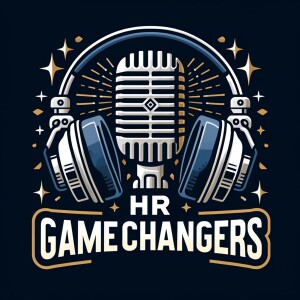Episodes

Sunday Jun 22, 2025
Sunday Jun 22, 2025
This episod of HR Gamechagers discsusses the challenges and opportunities facing the American manufacturing sector, particularly the significant labor shortage despite substantial investment. It highlights the need to modernize the industry's image to attract a new generation of workers, moving away from outdated perceptions towards a vision of high-tech, collaborative environments. It emphasizes the importance of offering competitive compensation and clear career progression paths, alongside robust apprenticeship programs that provide specialized skills for modern factory roles. It also discusses and advocates for knowledge transfer from experienced workers, the formation of regional coalitions to streamline talent acquisition, and the utilization of untapped talent pools and digital training tools to build a skilled workforce, ultimately presenting the labor shortage as a design flaw requiring strategic redesign.

Sunday Jun 08, 2025
Sunday Jun 08, 2025
This episode explores the growing importance of human-centric skills in a world increasingly shaped by technology and automation. Emphasizing that emotional intelligence, effective communication, and durable abilities like critical thinking are essential for individual success and organizational resilience. It highlights how these "soft skills" complement artificial intelligence and discusses methods for cultivating and measuring their development. Ultimately, suggesting that investing in these interpersonal capabilities is a strategic advantage in the evolving professional landscape.

Monday May 26, 2025
Monday May 26, 2025
This episode of HR Gamechangers discusses the rapid growth of data centers, particularly with demanding technologies like AI and liquid cooling, faces a significant challenge: a talent shortage in specialized fields like electrical engineering, construction, and operations. To overcome this, the industry is focusing on building pipelines through apprenticeships, community college programs, and veteran outreach, as well as upskilling existing staff in new areas like liquid cooling and sustainable practices. Prioritizing workforce well-being is also becoming crucial for retaining skilled personnel, while AI-driven planning and remote expertise tools are being adopted to optimize staffing and operations. It highlights that talent strategy must now be considered a core design element for data center projects, as important as infrastructure itself. EnJOY!

Tuesday May 06, 2025
Tuesday May 06, 2025
Graduating soon? This playbook unpacks AI skills, human skills, Networking 3.0, and negotiation moves recruiters love. Which strategy will you try first?

Saturday Apr 19, 2025
Saturday Apr 19, 2025
In this episode, Dave and Luisa explore the challenges of constant digital connectivity in the modern workplace, including burnout and decreased focus. It highlights research suggesting that intentionally disconnecting from technology can boost creativity, improve productivity, and foster better communication. They discuss identifying signs of digital overload and proposes strategies for establishing healthy boundaries with technology at work. Ultimately, advising for a mindful approach to technology use, emphasizing that purposeful disconnection is essential for individual well-being and thriving teams.

Sunday Mar 30, 2025
Sunday Mar 30, 2025
Effective HR communication is crucial for a thriving workplace, as it ensures employees understand important information and fosters trust and engagement. Key elements of strong HR communication include clarity, consistency, and accessibility of information, alongside transparency in explaining decisions. Conversely, poor communication can lead to confusion, disengagement, and an erosion of trust, negatively impacting productivity and reputation. Organizations can improve HR communication by establishing clear channels, using plain language, providing context, seeking feedback, training HR staff, and celebrating achievements. Ultimately, strategic HR communication shapes organizational culture, influences employee engagement, and contributes to long-term success and a positive industry standing.

Monday Mar 17, 2025
Monday Mar 17, 2025
This episode outlines strategies for navigating the evolving job market of 2025. It emphasizes the importance of rapid upskilling through programs and micro-credentials to meet the demands for broader skill sets and technological fluency. It highlights the power of non-traditional networking, encouraging proactive outreach and personal connections beyond standard applications. Furthermore, stresses the significance of focused personal branding and the demonstration of both technical and soft skills to stand out to employers. Ultimately, the information suggests that a proactive approach combining continuous learning, strategic networking, and a strong personal brand is crucial for career success in the coming years.

Saturday Mar 08, 2025
Saturday Mar 08, 2025
Tariffs in 2025 are significantly reshaping hiring and HR strategies for global talent management. Companies are adapting by reshoring, nearshoring, or embracing remote work to mitigate tariff-related disruptions. This impacts workforce planning, compensation, and benefits, requiring HR to balance budgets while attracting talent.
Organizations are shifting talent geographies and emphasizing cross-departmental collaboration to navigate new trade policies. Building skills in logistics, data analytics, and compliance becomes crucial. Ultimately, proactive HR strategies are essential to thrive amidst tariff-induced changes.

Thursday Feb 20, 2025
Thursday Feb 20, 2025
Employee turnover carries substantial hidden costs beyond obvious financial burdens, including lost productivity, knowledge, and diminished morale. Replacing experienced employees requires significant investment in recruitment, training, and onboarding, often taking months before new hires reach full productivity. Common reasons for employee departures include lack of career growth, toxic workplace culture, poor work-life balance, and inadequate recognition. Companies can improve retention by prioritizing career development opportunities, fostering a culture of trust and inclusion, and supporting employee well-being. Offering competitive compensation, flexible work arrangements, and valuing employee feedback are also essential strategies. Ultimately, prioritizing employee retention creates a more engaged and committed workforce, leading to a significant competitive advantage.

Saturday Feb 08, 2025
Saturday Feb 08, 2025
The episode explores the evolving nature of workplace loyalty, arguing that it's not dead but transformed. Modern employees prioritize factors like work-life balance, career growth, and competitive compensation, leading to more frequent job changes. Companies are responding by offering better benefits, flexible work arrangements, and opportunities for professional development to retain talent. It emphasizes that building loyalty requires mutual respect, transparency, and a culture that values both employee well-being and business success. Ultimately, it suggests a shift from traditional, long-term commitments to a more transactional, value-driven relationship between employers and employees.





